What to Consider When Adopting a Guinea Pig
Guinea pigs are cute, social, and can make amazing pets. But they
Guinea pigs are cute, social, and can make amazing pets. But they
by Cammi Morgan, | May 26, 2025

Guinea pigs can make wonderful, social, playful, and snuggly companions. As long as you’re well informed and prepared to provide for their needs, being a guinea-pig pet parent can be extremely rewarding. Before bringing them home, however, you’ll want to make sure you’ve learned all about their care needs and that you’re able to provide for them for possibly more than a decade.
This guide will provide a detailed overview of what pet guinea pigs need to thrive to help you decide if you’re ready to bring these squeaky little critters home. Read on to learn more.

Michaela / Adobe Stock
Adopting and caring for a guinea pig can be an extremely rewarding, fulfilling experience. But it’s crucial to make sure you’re fully prepared for the responsibilities of providing for their social, mental, and physical needs. Being ready to adopt these little critters means committing to providing them with a safe, caring, comfortable, enriching, and nurturing home for many years.
If you’re ready to adopt a guinea pig, you’ll have the financial ability to provide for them, a daily time and long-term commitment to their care and well-being, space for their housing and enrichment needs, the willingness to learn how to be a great caregiver, and an understanding of their social needs.
Before committing to bringing home these fluffy little squeakers, it’s important to make sure you’re informed on all the unique aspects of caring for guinea pigs. This includes considering their lifespan, exercise requirements, social and enrichment needs, diet, enclosure requirements, and grooming.
Adopt a Pet spoke with The Guinea Pig Sanctuary’s adoption coordinator, Brittany Blank, about what folks need to know before adopting a guinea pig.
Most guinea pigs kept as pets live for about five to eight years. However, some guinea pigs given excellent care may live a little past 10 years of age. It’s important to make sure you’re committed to caring for your guinea pig for their entire lifespan. Small pets such as guinea pigs, hamsters, and gerbils are often given to children as pets, and sadly, many end up in shelters or rescues once the child loses interest. If you’re adopting a guinea pig as a pet for your child, it’s imperative for you to personally commit to their care for their entire life.
Guinea pigs are highly social animals whose wild relatives naturally live in herds of one male, several females, and their offspring. While pet guinea pigs (Cavia porcellus) are domesticated, their social needs are still quite similar to those of their wild South American relatives (Cavia aperea).
“Guinea pigs need to be held and talked to daily. They crave interaction with other guinea pigs and their humans,” Brittany says. “An ignored guinea pig can become depressed and may stop eating. Even when there is more than one guinea pig in the area, they may still become solemn if they are not getting enough attention from people.” To address their social needs, guinea pigs should get “one to three hours of playtime each day…and getting a playpen or play gate can help give them a space to play.”
Since they are highly social animals, guinea pigs should be housed together or in small groups to meet their social requirements. This is critical for their well-being. “Female guinea pigs can live in herds, whereas male guinea pigs do best in pairs.” Brittany also notes that, to prevent injuries, guinea pigs should be bonded properly before being housed together.
You can often adopt rescued guinea pigs who are already bonded. If you are introducing ones who aren’t familiar with each other, however, you’ll need to allow time for them to slowly acclimate to each other in their own spaces first. Also, adopting two guinea pigs with similar energy levels can help establish a good match.
Start by housing them in separate enclosures where they can see each other without feeling threatened. Next, swap their bedding and toys so they can become acclimated to each other’s scent before meeting directly. Over a few days to a couple of weeks, slowly move their enclosures closer until they can easily see and sniff each other through a barrier. Finally, if all is going well, you can have them meet in a neutral area and carefully supervise their interactions, making sure there’s an abundance of food and toys available, so they won’t feel guarded over limited resources.
About 85 to 90 percent of a guinea pig’s diet should consist of high-quality hay, such as Timothy and orchard hay. Fresh hay should be available to them at all times to provide for their foraging, nutritional, and digestive needs. According to the RSPCA, you should also provide a daily portion of grass-based pellets formulated for guinea pigs, which provide essential vitamin C. Small daily portions of some fruits, veggies, and greens (such as cucumbers, sweet peppers, and romaine lettuce) are also excellent sources of vitamin C. Always make sure to check which veggies and fruits are safe and healthy for your guinea pig before feeding anything to them.
Guinea pigs need plenty of space to run around and play. They also need constant access to tunnels, pipes, and other small shelters to run through and spend time in. Providing these spaces in their enclosure meets both their need, as a prey species, to find places to hide and also gives them varied structures to run around in and interact with. They are naturally inclined to tunnel, so it’s important to give them materials to tunnel in, such as deep piles of hay.
For foraging enrichment, Brittany advises that “putting their pellets into a snuffle mat can help encourage foraging and is a good way to keep your guinea pig active and engaged with their environment. Having hay available in huge piles also allows them to eat, play, and sleep in it, which is great for them, and makes up [about] 90 percent of their diet.”
“Guinea pigs need to chew on harder things (apple sticks, compressed hay, etc.) constantly to help keep their teeth at the right length,” she also notes. “Although the hay chewing will do most of the work, they should still have blocks or wooden toys to help.”
Guinea pigs have specific space and enclosure requirements that you’ll need to meet for them to thrive and feel safe. Brittany notes that an enclosure should be “two feet by four feet at the very minimum for an average-sized guinea pig…the more space to run and play, the better.” She adds that their enclosure should be “fully cleaned at least two times a week. On the other days, old food, pellets, and droppings can be picked out, and new bedding can be added. When cleaning, always wear gloves, and make sure the [enclosure] is completely scrubbed down so that no bacteria builds up underneath their hay and bedding.”
The best bedding for guinea pigs is untreated paper, fleece, or cloth, with fleece being a top choice. Brittany cautions that “using wood pellets or wood shavings can cause splinters or make them sick because of the treatment used at the facilities.”
Guinea pigs have fairly minimal grooming requirements. Gentle brushing helps keep their coat and skin healthy, and they need nail trims about once per month or every two weeks. You can brush long-haired guinea pigs daily to a few times per week, while short-haired ones need to be brushed about once per week.
You’ll also need to clean their grease gland (caudal gland), located beneath the base of their tail bone, about once per month. To clean, apply coconut oil or diluted Dawn dish soap — three-quarters water to one-quarter soap — to the gland, and let it sit for a few minutes. Then, you can remove the grease buildup in a circular motion with a wet cotton pad or by gently rinsing with warm water. Finally, pat-dry your guinea pig with a clean towel. Distracting them with hay or treats during this procedure can help the process go more smoothly.

Marcin Benko / Pexels
Below are some aspects about guinea pigs or their care requirements that you might not know.
Guinea pigs are prey animals: Since guinea pigs are prey animals, they have specific care requirements to make sure they feel safe in their environment. They need plenty of comfortable places to hide and retreat to in their enclosure. Also, they should never be housed in a way that other pets in the home, such as cats or dogs, can make them feel threatened or stressed.
They need an exotic animal vet: Guinea pigs are typically classified as “exotic” pets in veterinary medicine. As such, you’ll need to look beyond a standard vet practice for their care. Many exotic-pet veterinarians in the US are qualified to care for guinea pigs, as are some small animal practices.
Guinea pigs are fragile: Although they have sturdy and stocky appearances, guinea pigs are quite fragile and susceptible to injuries if roughly handled. Learning how to properly, gently hold your furry little friends is critical to preventing injuries or fearful experiences. This will also help you bond.
Easily stressed: In addition to being physically fragile, guinea pigs can become easily stressed, especially if they don’t live in a stable environment. As prey animals, they are naturally more vigilant and nervous, and can struggle to cope in a constantly changing or noisy environment. It’s best to keep a steady routine of care and ensure they have plenty of safe, species-appropriate places to retreat to in their enclosure.
Set-up costs for a guinea pig include their enclosure, bedding, houses in the enclosure, food dishes, a water bottle, enrichment/foraging structures, toys, food, grooming supplies, and initial vet care. These initial costs often range between $200 to $300. For the care of two guinea pigs, monthly costs are about $50 to $80. A yearly vet exam may run about $100.
To adopt a guinea pig from a shelter or a rescue organization, expect to pay an adoption fee of about $30 to $50 per guinea pig. Rescues often offer reduced fees if you adopt a bonded pair or trio. For example, an organization may set a fee of $50 for a single guinea pig, but $80 for a bonded pair.
You can adopt a guinea pig at rescues, animal shelters, and on pet adoption sites such as Adopt a Pet. An excellent tool for expanding your adoption search, Adopt a Pet makes looking for your new guinea pig pals a straightforward process — just use the search functions to browse adoptable guinea pigs in your area. Once you find potential matches, you can reach out directly to the rescue, shelter, or rehomer.
You can adopt rescued guinea pigs from reputable rescues, animal shelters, or through pet adoption sites, such as Adopt a Pet.
No, guinea pigs are not easy to care for in the sense that they are complex, social animals who need daily interactions and have a range of social, mental, and physical needs. However, once you understand what they need to thrive, you can establish an effective routine to care for them. After you get used to this routine, you’ll likely find that they aren’t particularly hard to care for.
Guinea Pig Sanctuary - Rescue, Adoption, Surrender - Hampton, NH. (n.d.). Guineapigsanctuary. https://www.guineapigsanctuary.org.
Know your Guinea Pig is happy | RSPCA - RSPCA - rspca.org.uk. (n.d.). RSPCA. https://www.rspca.org.uk/adviceandwelfare/pets/rodents/guineapigs/behaviour.
What to feed a Guinea pig | RSPCA - RSPCA - rspca.org.uk. (n.d.). RSPCA. https://www.rspca.org.uk/adviceandwelfare/pets/rodents/guineapigs/diet.

Cammi Morgan is a nature and pet care writer living off-grid with her pack of rescue and foster dogs in the mountains of Southeast Appalachia. In addition to her work with Adopt a Pet, she has contributed to Animal Wellness Magazine, PetsRadar, Global Comment, A-Z Animals and other online publications. Her passions include animal rescue, mycology, hiking, and caving.
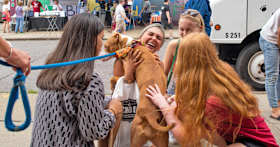
Shelters & Rescue

Adoption Advice

Shelters & Rescue
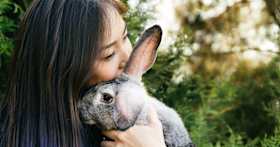
Adoption Advice
So you want a bunny? Here’s the reality check you need before committing to a pet rabbit.
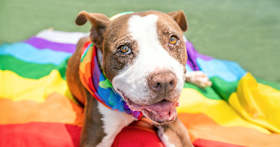
Shelters & Rescue
If you’re looking to donate money, supplies, or your time to a good cause, add these 10 animal charities to your list.
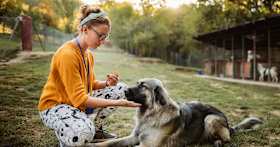
Shelters & Rescue
Looking to adopt, but not sure which type of pet adoption organization is right for you? This guide is here to help.

Foster & Volunteer
What every prospective foster parent should know before jumping in

Adoption Advice
Unfortunately, the term “adopt, don’t shop” exists for a reason, because buying a puppy can unwittingly come with a host of problems.
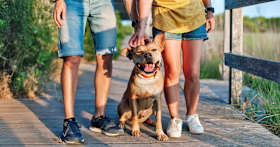
Adoption Advice
Adopting a pet is a process that factors in everything from your age to living situation. Here’s what you need to know.